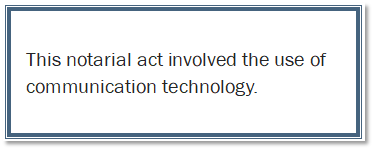In most instances, when you need a document notarized, you will be signing a paper document in the presence of a notary public. However, there are situations where you may need an electronic document notarized, or you may not be in the physical presence of a notary public when a document needs to be notarized. To accommodate these situations, North Dakota law allows for electronic notarization and remote notarization.
Electronic Notarization
Electronic notarization, often referred to as In-Person Electronic Notarization (IPEN), is similar to traditional in-person notarization, but it is for an electronic document rather than a paper document. You must still appear before the notary public in person, but both you and the notary public sign the document electronically.
Remote Notarization
Remote notarization is performed when you are not in the physical presence of the notary public. Instead, the notarization takes place online using audiovisual technology during a recorded session.
When completing a remote notarization, the notary public must be able to verify that you, as the signer, are who you say you are through one of these options:
- Personal knowledge of your identity
- Providing at least 2 different types of identity proofing (example: knowledge-based questions answered online)
- A credible witness who appears before the notary to provide verification on oath or affirmation confirming your identity
Types of Remote Notarization
Remote notarization performed on paper documents is known as Remote Ink Notarization (RIN) and remote notarization performed on electronic documents is known as Remote Online Notarization (RON).
Remote Ink Notarization (RIN) - Paper Documents
Remote Ink Notarization (RIN) is used when you want to have a paper document notarized remotely. The paper document will include a wet-ink signature and the only type of notarial act that may be performed using RIN is an acknowledgment.
During RIN, you, as the document signer, are in possession of the document. You will display, identify, and sign the document. You will also include on the document, or attach to the document, a declaration similar to:
![“I declare under penalty of perjury that the record of which this declaration is a part or to which it is attached is the same record on which [name of notary public], a notary public, performed a notarial act and before whom I appeared by means of communication technology on [date].” This is followed by the signature and printed name of the remotely located individual.](/sites/www/files/documents/notary-apostille/rin-declaration.png)
Within 3 days after the notarization, you must send the document and declaration to the notary public. The notary public will then indicate in the notarial certificate that the notarial act was performed using communication technology by including a statement similar to:
![“This notarial act involved the use of communication technology. “I, [name of notary public], witnessed, by means of communication technology, [name of remotely located individual], sign the attached record and declaration on [date].”](/sites/www/files/documents/notary-apostille/rin-commtech.png)
It is important to note that the effective date of a RIN is the date on which you, the signer, signed the declaration.
Remote Online Notarization (RON) - Electronic Documents
Remote Online Notarization (RON) is used when you have an electronic document that needs to be notarized remotely. RON can be used for a verification on oath or affirmation, an acknowledgment, or witnessing a signature.
The certificate of notarial act will include a statement indicating that the notarization was performed using communication technology, similar to:

Additional Details
Tangible Copies of Electronic Documents
If you have an electronic document that was notarized using either electronic notarization or remote notarization and need a tangible copy of the document, the notary public may certify that the tangible copy is an accurate copy of the electronic document.
Disclaimer: Content provided on this website is for informational purposes and not intended as advice. Consultation with legal, tax, and/or business professionals is recommended to ensure appropriate consideration of the implications of your decisions.
